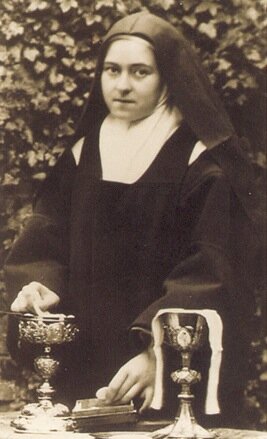On Oct. 9, 1997 Pope John Paul ll officially proclaimed St Therese of Lisieux as Doctor of the Church. She was the third woman in the history of the Church to receive this honor. Her Feast Day is October 1st.
Not many people are aware that St. Therese felt deeply a vocation to priestly ministry. "I feel in me the vocation of the priest...My vocation is love ..My vocation is love.
She is a role model for women priests today because the essence of priestly ministry is living love in service to God's people to bring about a new, renewed ministry of inclusivity, justice and equality. Like Therese we are called to reflect God's Passionate Love in the details of our lives everyday. It is often the small things that mean the most.
Therese's "Little Way" demonstrates that the path to God is found in hidden, unnoticed details of our lives-like making delicious peanut butter sandwiches for our children day in and day out, cutting the grass for an older neighbor, listening to a friend who has experienced a major loss in her life, loving our spouse, children and ourselves just as we are, faults and all. Can we like, Therese, live this kind of love? Can we accept that we are loved passionately by our God? That's the bottom line of Therese's "Little Way" complete confidence in God's love. Ultimately, that's all that matters. What more do we need?" (Praying with Visionary Women, by Bridget Mary Meehan, p.163.)
http://womensordinationcampaign.org/st-thrse-of-lisieux
" I sense in myself the vocation of Warrior, Priest, Apostle, and Martyr. In the heart of the Church, my Mother, I will be love." (5) —St. Thérèse of Lisieux
"Her yearning to be a priest is well documented. Her journals record it. She confided in her sister Céline about the calling. At a young age, Thérèse wrote: ‘I feel in me the vocation of PRIEST; with what love I would carry you in my hands when, at my words you would descend from Heaven.’ 6 She was convinced that she would have been a good preacher and even better than the priests she heard. On her sickbed she composed what she would say from the pulpit. 7

THÉRÈSE OF LISIEUX PREPARING CIBORIUM FOR MASS
In testimonies from the process of her beatification there is a detailed statement from Céline. She shared that Thérèse preferred death to the continued painful endurance of living with her unfulfilled call. Thérèse believed God had let her become sick so she would not have to suffer rejection by the Church from priesthood. In her testimony, Céline said:
‘… before she was really ill, Sister Thérèse told me she expected to die that year. ... When she realised that she had pulmonary tuberculosis, she said: 'You see, God is going to take me at an age when I would not have had the time to become a priest ... If I could have been a priest, I would have been ordained at these June ordinations. So, what did God do? So that I would not be disappointed, he let me be sick: in that way I couldn't have been there, and I would die before I could exercise my ministry.' 8
‘The sacrifice of not being able to be a priest was something she always felt deeply. During her illness, whenever we were cutting her hair she would ask for a tonsure [the practice of shaving the crown of the head that was part of the ritual of ordination until it was abandoned by papal order 9 in 1972] ... But her regret did not find its expression merely in such trifles; it was caused by a real love of God, and inspired high hopes in her. The thought that St Barbara had brought communion to St Stanislas Kostka thrilled her. 'Why must I be a virgin, and not an angel or a priest?' she said. 'Oh! what wonders we shall see in heaven! I have a feeling that those who desired to be priests on earth will be able to share in the honour of the priesthood in heaven.' (10)

No comments:
Post a Comment
Note: Only a member of this blog may post a comment.